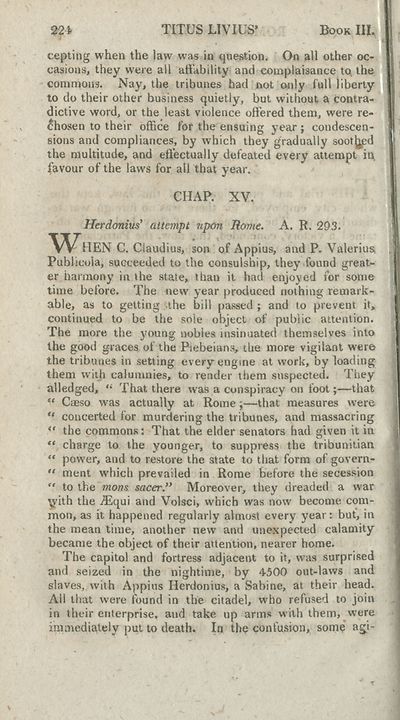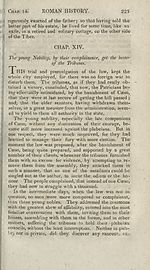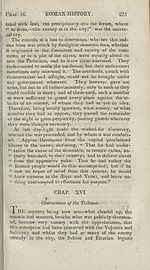Download files
Complete book:
Individual page:
Thumbnail gallery: Grid view | List view

TITUS LIVIUS’
22t TITUS LIVIUS’ Book IIL I
cepting when the law was in question. On all other oc- I
casions, they were all aft’ability and complaisance to, the I
commons. Nay, the tribunes had not only full liberty 1
to do their other business quietly, but without a contra-
dictive word, or the least violence offered them, were re-
£hosen to their office for the ensuing year ; condescen¬
sions and compliances, by which they gradually sooted
the multitude, and effectually defeated every attempt in,
favour of the laws for all that year.
CHAP. XV.
Hcrdonius' attempt upon Rome. A. R. 293.
HEN C. Claudius, son of Appius, and P. Valerius, .
Publicola, succeeded to the consulship, they found great¬
er harmony in the state, than it had enjoyed for some
time before. The new year produced nothing remark¬
able, as to getting .the bill passed ; and to prevent it,
continued to be the sole object of public attention.
The more, the young nobles insinuated themselves into
the good graces of the Plebeians, the more vigilant were '
the tribunes in setting every engine at work, by loading j
them with calumnies, to render them suspected. They 1
alledged, u That there was a conspiracy on foot;—that s
“ Caeso was actually at Rome;—that measures were j
" concerted for murdering the tribunes, and massacring
“ the commons: That the elder senators had given it in :
“ charge to the younger, to suppress the tribunitian
“ power, and to restore the state to that form of govern- I
“ ment which prevailed in Rome before the secession j
“ to the marts sacer.” Moreover, they dreaded a war j
\rith the Aiqui and Volsci, which was now become com¬
mon, as it happened regularly almost every year: but, in |
the mean time, another new and unexpected calamity
became the object of their attention, nearer home.
The capitol and fortress adjacent to it, was surprised
and seized in the nightime, by 4500 out-laws and
slaves, with Appius Herdonius, a Sabine, at their head.
All that were found in the citadel, who refused to join .
in their enterprise, and take up arms with them, were j
immediately put to death. In the confusion, some agi- j
22t TITUS LIVIUS’ Book IIL I
cepting when the law was in question. On all other oc- I
casions, they were all aft’ability and complaisance to, the I
commons. Nay, the tribunes had not only full liberty 1
to do their other business quietly, but without a contra-
dictive word, or the least violence offered them, were re-
£hosen to their office for the ensuing year ; condescen¬
sions and compliances, by which they gradually sooted
the multitude, and effectually defeated every attempt in,
favour of the laws for all that year.
CHAP. XV.
Hcrdonius' attempt upon Rome. A. R. 293.
HEN C. Claudius, son of Appius, and P. Valerius, .
Publicola, succeeded to the consulship, they found great¬
er harmony in the state, than it had enjoyed for some
time before. The new year produced nothing remark¬
able, as to getting .the bill passed ; and to prevent it,
continued to be the sole object of public attention.
The more, the young nobles insinuated themselves into
the good graces of the Plebeians, the more vigilant were '
the tribunes in setting every engine at work, by loading j
them with calumnies, to render them suspected. They 1
alledged, u That there was a conspiracy on foot;—that s
“ Caeso was actually at Rome;—that measures were j
" concerted for murdering the tribunes, and massacring
“ the commons: That the elder senators had given it in :
“ charge to the younger, to suppress the tribunitian
“ power, and to restore the state to that form of govern- I
“ ment which prevailed in Rome before the secession j
“ to the marts sacer.” Moreover, they dreaded a war j
\rith the Aiqui and Volsci, which was now become com¬
mon, as it happened regularly almost every year: but, in |
the mean time, another new and unexpected calamity
became the object of their attention, nearer home.
The capitol and fortress adjacent to it, was surprised
and seized in the nightime, by 4500 out-laws and
slaves, with Appius Herdonius, a Sabine, at their head.
All that were found in the citadel, who refused to join .
in their enterprise, and take up arms with them, were j
immediately put to death. In the confusion, some agi- j
Set display mode to:
![]() Universal Viewer |
Universal Viewer | ![]() Mirador |
Large image | Transcription
Mirador |
Large image | Transcription
| Antiquarian books of Scotland > Curiosities & wonders > Titus Livius' Roman history > (228) |
|---|
| Permanent URL | https://digital.nls.uk/115985885 |
|---|
| Description | Thousands of printed books from the Antiquarian Books of Scotland collection which dates from 1641 to the 1980s. The collection consists of 14,800 books which were published in Scotland or have a Scottish connection, e.g. through the author, printer or owner. Subjects covered include sport, education, diseases, adventure, occupations, Jacobites, politics and religion. Among the 29 languages represented are English, Gaelic, Italian, French, Russian and Swedish. |
|---|

